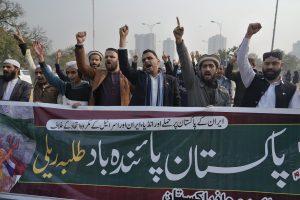Iran’s surprise air raids in Pakistan’s Balochistan province earlier this week sent shockwaves through the corridors of power in Islamabad. The attack allegedly targeting a militant group has not only caught Pakistan’s policymakers off guard but also has left the public bewildered.
Pakistan retaliated by expelling the Iranian envoy in Islamabad. It carried out counterattacks in areas it claimed to be Baloch insurgent strongholds in the Iranian border province.
The 1,000-kilometer border between Iran and Pakistan has long been a source of concern due to its instability and lack of control. The border region has seen insurgent activity on both sides. Pakistan and Iran have occasionally accused one another of not doing enough to combat these groups. However, both countries have implemented cooperative measures and focused on communication to stop accidents and escalation.
Recent events have left Pakistan feeling betrayed.
According to Iran’s Foreign Minister Hossein Amir-Abdollahian, its military strikes were directed against a Sunni radical organization, Jaish al-Adl, which he called an “Iranian terrorist group” operating in Pakistan. “We only targeted Iranian terrorists on Pakistani soil,” and his country “respects the sovereignty and territorial integrity of Pakistan,” Amir-Abdollahian stated.
Pakistan released a statement after its military strikes that was almost identical to the one Iran had released to defend their attack. According to Islamabad, the country only targeted the militant hideouts of Baloch insurgency groups in Iran due to the serious threat they represented to Pakistan’s national security.
In an apparent attempt to mitigate the situation, Iran later admitted that the persons killed in the Pakistani strike on Iranian territory were Pakistani nationals and that “an investigation is underway to determine how they had come to reside on the Iranian side of the border.” Another statement by Iran’s foreign office described Pakistan as a “friendly and brotherly neighbor” and warned that “enemies and terrorist sympathizers” will not be allowed to taint good relations.
It appears that both countries will get back to using diplomacy to figure out what went wrong and find a solution. However, in the wake of this incident, Tehran has lost a great deal of goodwill and friends in Pakistan.
The tit-for-tat military strikes happened at a time when Iran is under increasing pressure from various quarters because of the ongoing conflict between Israel and Gaza, and Tehran’s purported support for violent groups in the Middle East.
Iran’s strike left many in Pakistan questioning the motives behind such an illogical and unilateral action. Pakistani officials believe that Iran intentionally attempted to place Pakistan in a precarious situation at a very dangerous moment. Pakistan is not the only country that Iran has targeted; over the past week, Tehran undertook similar actions in Iraq and Syria. It indicates that Iran, wants to flex its muscles at the cost of Pakistan. That’s a slap in the face for Islamabad, which has tried to deepen ties and forge partnerships with Tehran despite pressure from several foreign governments, including Saudi Arabia and the United States.
Pakistan is even more incensed by Iran’s bombing of the country because it happened even as the Iranian foreign minister and Pakistani Prime Minister Anwaar-ul-Haq Kakar were meeting in Davos, Switzerland, for the World Economic Forum’s Annual Meeting.
Iran ought to have informed the Pakistani premier if it had knowledge of a militant group operating over the border that posed an immediate threat, so that Pakistan could have taken action against it. Pakistan has done this in the past on Iran’s behalf.
What makes this incident even more puzzling is the fact that the Iranian strikes came when the Pakistani and Iranian fleets were taking part in a joint naval training exercise in the Strait of Hormuz. In addition, the day before Iran launched its attack a high-ranking Iranian delegation was in Pakistan to talk about the problem of extremists exploiting Afghan soil against the interests of both countries.
Islamabad is questioning whether Tehran’s decision-makers comprehended all the factors surrounding Pakistan’s assessment of the threat and its anticipated reaction in light of Iran’s miscalculation. There are also doubts as to whether the Islamic Revolution Guards Corps (IRGC) Ground Force’s Border Taskforce even communicated with the political establishment before deciding to attack Pakistan.
Pakistan is now the only country to strike Iranian soil in almost 40 years as a result of the incident, raising concerns over whether Iranian decision-makers are evaluating their options rationally.
Iran should have realized that Pakistan would not respond to the incident with a mere diplomatic protest, given the tense borders with Afghanistan and India. A passive response from Pakistan would have been interpreted in Kabul and New Delhi as a sign of weakness. Pakistan is concerned about the possibility of similar events unfolding on its eastern border, given upcoming elections in India. Furthermore, with relations with Afghanistan at a crossroads, the country had to convey a strong message to Kabul as well.
If there had been less internal pressure, external threats, and a different situation along its borders, Pakistan might not have responded militarily to Iran’s aggressiveness. But given the context, Pakistan had to hit back to demonstrate to people both locally and globally that it was capable of taking decisive action in the event of misadventure.
Only a few days ago, Pakistanis were applauding Iran for its assistance to the Palestinians in their struggle against Israel and for taking a strong stand in the Middle East to oppose the United States on multiple fronts. But this pro-Tehran mindset has been replaced with resentment toward Iran as a result of the country’s attack on Pakistan. All of a sudden, Pakistanis are viewing Iran as a threat to their country’s stability rather than as a power deserving of recognition for standing up to powerful countries in the Middle East.
Moving forward, it will be more difficult for Iran and Pakistan to communicate and trust one another to the same extent as before the unexpected military confrontation.
































